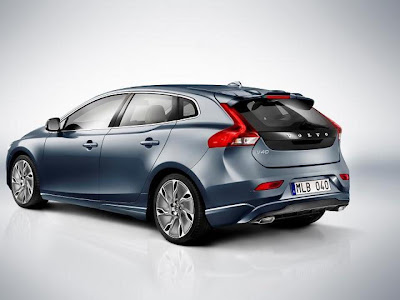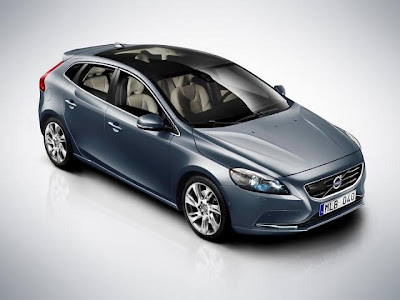The all-new Volvo V40 is a sporty five-door hatchback that sets new ride handling, fuel efficiency and safety standards in its class.
Its eye-catching coupé design, which uses styling cues from the C30 coupé and classic P1800ES Volvo, is sportier and sleeker than the homogeneous class norm.
2013 Volvo V40
2013 Volvo V40
2013 Volvo V40
Special attention has been given to handling, steering feel, agility and ride comfort. Volvo engineers believe that the Volvo V40 is now the class benchmark for dynamic fineness.
Volvo's reputation for safety leadership has not been overlooked. A new innovation, Pedestrian Airbag Technology, joins a previous Volvo world-first, Pedestrian Detection with Full Auto Brake, which was first shown on the Volvo S60. Together, they ensure the all-new V40 offers unrivalled protection for pedestrians, as well as for the car's occupants.
The new Pedestrian Airbag, which makes its world debut on the Volvo V40, inflates from under the rear edge of the bonnet when the car detects that it has hit a pedestrian. The raised bonnet better cushions the unfortunate pedestrian, and the airbag also protects the pedestrian's head from the "hard points" at the base of the windscreen and the lower A-pillars.
In Europe, 14 per cent of all traffic fatalities are pedestrians. In China, it's over 25 per cent.
City Safety, an innovation first shown on the Volvo XC60 to avoid noise-to-tail urban accidents, has been further improved for the Volvo V40. It now works at up to 50 km/h (31 mph), instead of 30 km/h (19 mph). Insurance claims involving the Volvo XC60 show that City Safety has reduced personal injury claims by 51 per cent, while vehicle repair costs have been lowered by more than 20 percent. Little wonder that many insurers now reduce premiums for Volvo drivers.
Pedestrian Airbag Technology, Pedestrian Detection and City Safety are all part of Volvo's IntelliSafe safety philosophy. Other new safety features on the Volvo V40 include a Cross Traffic Alert radar system - which helps you reverse out of a parking space and see traffic coming from the side - and an improved Blind Spot Information System (BLIS). This new radar-based technology still warns of vehicles in the blind spot, on both sides, but in addition now warns of vehicles approaching rapidly from the rear - making it safer, for example, to change lanes on the motorway.
Volvo also has a time-honoured reputation for environmentally friendly motoring - the three-way catalytic converter with lambda sensor is among Volvo's many green innovations. The all-new V40's 1.6-litre D2 engine emits only 94 g/km (when fitted with 205/55 R16 wheels) of CO2, a class-leading figure. This also offers major company car taxation, road tax and residential parking savings. Little wonder the Volvo V40 is so good in this area: one third of Volvo's entire research and development budget is earmarked for cutting CO2 emissions.
"The V40 is our first C-segment five-door hatchback," says Volvo's President and CEO Stefan Jacoby. "We expect most buyers will be new to Volvo. We also believe it is a class leader in so many areas, from design, driving dynamics, safety, to fuel economy. It perfectly illustrates our 'Designed Around You' philosophy. A car that is seamlessly connected to the driver, which is easy and pleasing to use, which handles in a very intuitive way and which cares for people."
The design is particularly striking. The exterior was styled by Volvo's Californian studio in Camarillo by American Chris Benjamin. "I wanted an emotionally engaging car that looked like a coupé but had the practicality and functionality of a five-door hatchback," he says. The Pedestrian Airbag Technology allowed him to lower the bonnet line and lower the whole car. It's actually 29 mm (just over an inch) lower than a C30 coupé, one of the lowest hatchbacks on the road. The rear styling is based on the C30, which in turn took cues from the classic P1800ES of the '70s.
The cabin design priorities were to give, "a large car feel inside a small car". The dash is wide - accentuating the big car feel - while a new high-tech TFT (thin film transistor) instrument digital display is available. Three different instrument displays can be selected, including an "eco" setting to help you drive more economically and a "performance" mode to better suit more spirited driving. There is also a more classical "elegance" mode. TFT instrumentation is available as an option on all models in the Volvo V40 range.
The Volvo V40 comes with Bluetooth music streaming and handsfree mobile connectivity as standard. A navigation system with directions in the main instrument cluster, and a mobile app that can find your car in a large car park, lock or unlock doors and even give you a journey log.
These choices are all part of Volvo's innovative infotainment system, giving outstanding connectivity, security and personalisation.
The seats are new and continue Volvo's fine reputation for occupant comfort. The rear seat is prominently sculpted to offer maximum support for two and sees them positioned slightly more inboard than is the norm, improving comfort and forward visibility. Nonetheless there is room for three in the rear, and a trio of three-point seat belts (a Volvo invention, of course) in the back seat.
An optional panoramic glass roof improves the "big car feel" of the cabin. Another unusual and stylish design touch is the rimless rear view mirror - further proof of the Volvo V40's design focus and crisp, uncluttered detailing.
Driving pleasure was a priority. "We sought dynamic leadership in this class and I'm confident we have achieved it," says Stefan Karlsson, Manager of Vehicle Dynamics and Calibration. "Our goal was to offer a truly connected feel, to give great driver confidence. If a driver feels well connected, he or she feels in control. This not only improves driving enjoyment, it also improves dynamic safety."
Ride comfort was also crucially important. "We just don't accept that agility should come at the expense of comfort. It is not necessary."
The damping - a key quality in comfort and driver interaction - was mostly calibrated by testing on British B-roads, "the best real world testing ground," says Stefan Karlsson. "They are extremely demanding roads, which is why so many cars struggle on them. They are brilliant for damper tuning, which in turn improves ride comfort, steering response, handling and agility."
The all-new Volvo V40 comes with three different diesel engines, and three petrol engines. They include a 1.6 diesel, which gives an outstanding and class-leading CO2 figure of 94 g/km (equivalent to 78.5mpg on the combined cycle), a sporty 177hp 2.0-litre five-cylinder diesel, and the high performance T5 petrol, good for 254hp. All engine and gearbox versions have start/stop technology, to boost economy and reduce emissions.
Volvo Car UK expects the D2 to be the big selling engine, with 63 per cent of UK sales.
Three trim levels are offered - ES, SE and SE Lux. Prices start at £19,745 for the D2 ES. The cars are all extremely well equipped. The entry level ES has City Safety, Pedestrian Airbag, Bluetooth hands-free, High Performance Audio, Electronic Climate Control, leather steering wheel and a cooled glovebox as standard.
Taking into account equipment levels, the Volvo V40 is not only less expensive than the equivalent Audi A3 and BMW 1-Series, but also undercuts many mass-made rivals too.
Just over 12,000 are likely to be sold in the UK during the first full calendar year (2013). That would make the UK the V40's biggest market worldwide.
UK customer deliveries begin in September 2012, with the high-performance T5 coming later in 2012. The Volvo V40 is a new class entrant for Volvo, but it will also replace the S40 and V50.
Articles Source : NetCarshow



No comments:
Post a Comment